Even though the Ether has managed the market turbulences at the beginning of 2018 very well and can still be seen as an attractive investment: Anyone who has bought Ether (ETH) wants to sell Ethereum again at some point.
A distinction must be made between an exchange in fiat money, such as the Euro or the US Dollar, and an exchange in another cryptocurrency. Furthermore, there is also the possibility to conclude a forward trade by selling Ether (without actually owning the coins) and thus profit from falling prices. I will go into all three cases in more detail below.
1. Exchange Ether for fiat money (e.g. Euro or USD)
The exchange in fiat money is simply the sale of your Ether and the credit of the returns in Euro or USD to your bank account, your credit card or any other method of payment of your choice.
Step 1: Determine the best exchange rate
First you should find out which provider offers you the most fiat money (EUR or USD) for your Ether. Although the numerous price tickers usually show a similar price per Ether, the prices on the individual exchanges can differ significantly. For this reason, it is advisable to first take a look at the various online exchanges and their current prices.
One service that offers a great overview is Cryptowatch. Here you can see at a glance the most important crypto exchanges, and even almost in real time the price on which Ether was sold here recently. Below is a screenshot showing the price per Ether at the different exchanges. Only exchanges that exchange in Euros and/or USD are listed. Exchanges that also support other currencies can also be displayed if required.
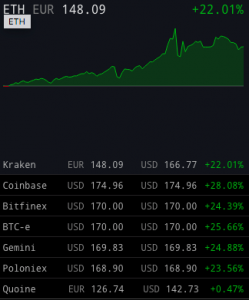
In this example of Cryptowatch (from 2017) it can be seen that there is a price difference of over 20 EUR per Ether. With Kraken you get 148,09 EUR and with Quoine only 126,74 EUR for each Ether. In addition, the EUR / US Dollar exchange rate should always be kept in mind. With Coinbase¹, for example, a change at a rate of 174.96 USD is the best price per Ether also in EUR, because this corresponds to approx. 154 EUR. However, there is also the currency risk, and later a small exchange fee of USD to EUR in case you want get Euro. However, these amounts are usually insignificantly small and depend on the bank or fiat money Institute that makes your withdrawal.
Step 2: Register at a Crypto Exchange
Once you have determined the best exchange rate at a crypto exchange, you have to create an account there. This is usually free of charge.
Note: If you are thinking about trading more frequently with Ether on exchanges, we also recommend an account with a service like Cryptowatch. There you can buy or sell your Ether directly at the desired exchange with a few clicks. However, this service costs about 15 USD/month. So it’s only worth it if you want to trade Ether more regularly.
Step 3: Sell Ethereum on an crypto exchange platform
After you have registered at a crypto exchange platform or service provider for Ethereum, e.g. Coinbase¹, you can sell your ETH there.
If you want to sell Ethereum from your local offline wallet there, you must first “transfer” it to your Coinbase online wallet. First determine the ETH address of your online wallet.
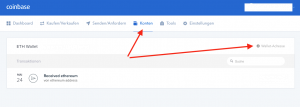
Afterwards open your offline wallet (e.g. MIST) and click on “send” there.
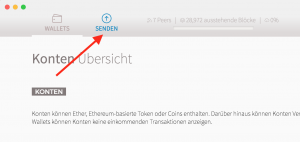
Then enter the ETH address of your Coinbase online wallet. Afterwards enter the amount of Ether you would like to transfer and click on “Send”.
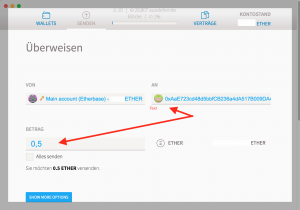
The defined amount of Ether is then transferred to your Coinbase online wallet. In Coinbase, you can then sell Ethereum to Coinbase via the menu item “Sell”. The amount in Euro or USD will then be credited to your bank account.
2. Exchange Ethers into other cryptocurrencies
The procedure for selling Ether in other cryptocurrencies is a bit easier than exchanging it for fiat money. There are basically two possibilities.
Option 1: Exchange via exchange platform
Similar to exchanging Ether for fiat money, an exchange platform can also be used when exchanging for another cryptocurrencies. Cryptowatch helps you to find the best platform for a currency pair. The following example shows under which conditions Ether can be exchanged for Ripple on Binance¹ or Bittrex.
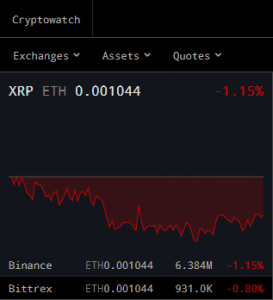
This option can make sense if you have already deposited your ETH credit in an online account at one of the crypto exchanges. Please consider that this is not advisable. The credit can disappear very quickly from the platform in the event of a hacker attack. Howerver, in this example, due to the availability of the coins in the online wallet of the platform, you are only one trade away from owning the new currency.
Option 2: Exchange via crypto-exchange
If you keep your ETH balance in your own wallet and therefore not within the control of a central institution (which is recommended), it would be quite complicated to do the exchange via an exchange platform. First you would have to transfer the balance of Ether to a exchange platform, exchange it there and then transfer the new currency to another wallet. In addition, the transfer of credit between different wallets and service providers can incur fees that make the exchange very costly. If you want to exchange Ether directly from one wallet into another currency (and another wallet), exchange service providers such as Changelly¹ are recommended.
Consider: In addition to the Ethereum Wallet, you will also need a wallet of the currency you wish to buy.

After entering the two currencies and the wallet addresses, the transaction can be started. The exchange rate offered by Changelly was quite similar to that offered by the crypto exchanges at the time we tested it. At Changelly, we got 98.5 ripples for 0.1044 Ethers. With a direct exchange at Binance we got approx. 1.5 ripple (about 1.5% more) at the same time. You do not have to register with Changelly and you save the fees which may be incurred when transferring from the currency exchange to the Wallet.
3. Conduct a forward contract for the sale of Ether
As a third option, I have included the sale of Ether as a forward trade through the use of CFDs. CFD stands for Contract of Difference. That’s an agreement between two parties on the difference between the current and future value of an object. The parties shall specify the underlying object of the transaction. The object is therefore often called an underlying. For example, shares, commodities or even cryptocurrencies can serve as the underlying. It is important to note that when trading CFDs you do not physically own the underlying (in our case Ether). The value of the CFD is only linked to the performance of the Ether.
Assuming you want to bet on a falling price of Ethereum. Then you would take a selling position at an Ethereum CFD. If the Ethereum price at the end of the contract period is less than the price at the beginning, you will receive the difference. Optionally, a leverage can often be defined for such a transaction. The leverage multiplies the profit achieved, but also a possible loss in value.
Opportunities and risks in trading CFDs
As described above, it is possible to profit from both rising and falling prices with a CFD (and lose money if the course goes into the wrong direction). Other advantages of trading cryptocurrencies with CFDs are that no wallet is needed, the CFD traders are usually regulated and there is often the possibility to multiply the profits with a lever. These advantages are contrasted by the fact that the functionality of CFDs is not easy to understand. Because of that the loss rate (up to max. 100% of the capital investment) is often slightly underestimated when using a lever.
For this reason, it is very important that you familiarize yourself with the functionality of CFDs before trading. A CFD Broker offering a Training-Account and a 24/7 information hotline for this purpose is Plus500. The service provider also has a very clear platform and charges no commissions for trading CFDs. Financing is done via the spread, i.e. the difference between the purchase price and the sales price of the contracts.
Summary
If you want to exchange ETH for fiat currency, you should first check which exchange platform offers you the best price. Cryptowatch can be very helpful here. Afterwards you can register at the respective exchange service provider, such as Coinbase¹ and exchange your Ether for Euro.
In case you want to exchange Ether for another crypto currency, you can do this either via an crypto exchange like Binance¹ or via a crypto exchange service like Changelly¹. Which option is beneficial for you depends on where your Ethers are stored and into which cryptocurrency you would like to exchange them.
If you don’t want to sell Ethereum physically, but want to profit from falling prices at short notice, then CFDs are the right instrument. For example, you can trade Ethereum-based CFDs on Plus500². The platform also gives you the opportunity to learn more about how CFDs and other financial products work.
Please note: Just as with the crypto currencies themselves, CFDs are subject to high price fluctuations (volatility). This means that you should only invest the money that you are prepared to lose in the worst case. Furthermore, this contribution does not constitute investment advice.
I wish you a lot of fun and success!
| ¹Affiliate link |
| Note: The content on ethblog.de is for information purposes only and does not constitute investment advice or any other recommendation within the meaning of the Securities Trading Act. |
- How to buy Ethereum, Ether, ETH? - April 12, 2018
- How to sell Ethereum, Ether, ETH? - March 19, 2018
- How to buy and sell Ripple? - March 15, 2018

